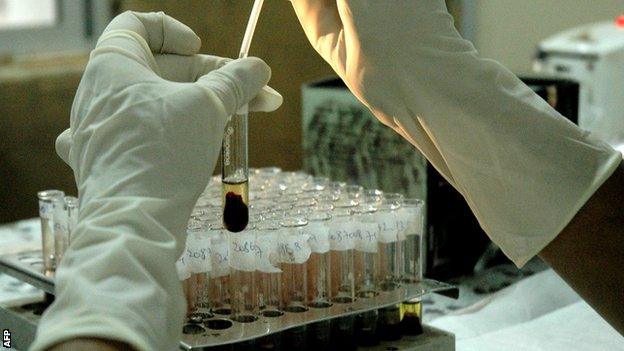Uefa: New drug-testing plans and 10-match bans for racism
- Published

Uefa will retrospectively study 900 doping samples given since 2008 as it attempts to combat use of performance-enhancing drugs in European football.
Though it will not lead to future punishments, the governing body intends to identify the scale of steroid use.
Uefa will also carry out blood testing in more competitions from 2013-14, and consider using biological passports.
A proposal for 10-match European bans for players and officials found guilty of racism has also been ratified.
How does blood doping work?
For racist incidents involving spectators, a partial stadium closure for the first offence and a full stadium closure for a second, coupled with a fine of 50,000 euros (£42,800), will be applied.
The new measures were on the agenda at Uefa's executive committee meeting, held in London prior to Saturday's Champions League final between Borussia Dortmund and Bayern Munich.
In February, Arsenal manager Arsene Wenger said he had asked Uefa several times to implement new drug-testing procedures.
"When you have a doping control at Uefa, they do not take blood, they take only urine," the 63-year-old said. "I have asked many times [at Uefa meetings] in Geneva [for that to be changed]."
The World Anti-Doping Agency's president has also accused football of not doing enough to stop doping.
Talking about the blood-boosting drug involved in the case of disgraced cyclist Lance Armstrong, John Fahey, said: "I simply say this about football - they are not testing enough for EPO. They can do more and we encourage them to do more."
Previously, blood testing has only taken place at European Championships.
The extent of the use of performance-enhancing drugs in football was hinted at in the Operation Puerto case in Spain.
While that investigation, which led to Eufemiano Fuentes being found guilty of running one of the world's largest sports doping rings, centred around cyclists, the Spanish doctor has boasted of a client list that extended into a number of other disciplines.
It may never be known if that was the case, as the blood bags used to convict Fuentes have been ordered to be destroyed, a ruling Spain's anti-doping agency (AEA) plans to appeal.
- Published1 May 2013
- Published30 April 2013
- Published12 February 2013
- Published9 February 2013
- Attribution
- Published31 March 2012